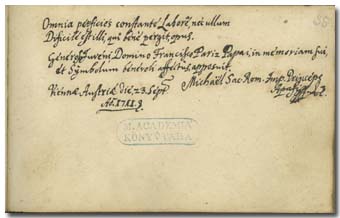
Omnia perficies constante laborê, nec ullum
Difficile est illi, qui bene pergit opus.
Generoso Juveni Domino Francisco Pariz Papai, in memoriam sui, et
Symbolum benevoli affectûs, apposuit
Michaël Sac[ri] Rom[ani] Imp[erii] Princeps Apafi MP.
Viennae Austriae, die 23. Sept. A[nn]o. 1711. |
|
You can reach everything by constant labour, nothing is difficult
for him who does his job well.
I wrote this for the noble young Ferenc Páriz
Pápai as a memento and a sign of my benevolent feelings
Mihály Apafi, Prince of the Holy Roman Empire.
In Vienna of Austria, on September 23, 1711.
|
p.
35. Vienna, September 23, 1711
Apafi, Mihály, II.
(1676-1713), Prince of
Transylvania, memoire writer
Mihály Apafi was born on October 13, 1676 in
Gyulafehérvár (Alba Iulia) a son of Mihály I. Apafi (1632-1690),
Prince of Transilvania, and Anna Bornemissza (?-1688). At the age
of only five his father managed to have him elected Prince of
Transylvania, but after the death of the former the affairs of the
country were really decided by the Austrian Council of Government.
In 1694 he married Countess Katalin Bethlen of Bethlen (died
around 1725 in Vienna), whose prayer book contains the renowned
song “Like a swift dear when hurt by the hunter”
(first edition: Bujdosásnak
emlékezet-köve, Lőcse, 1726). When General Caprara in 1695
marched with his army in Transylvania, Apafi was deprived of his
princely title, and taken to Vienna together with his wife.
Leopold I. granted him the title of imperial prince, and thus the
Principality of Transylvania also formally ceased to exist after
one and half centuries of existence. He received a life annuity,
and died in Vienna on February 1, 1713. His diary was published by
Ernő Tóth: I. Apafi Mihály és II. Apafi Mihály
erdélyi fejedelmek naplója, 1634-1694. Kolozsvár: Erdélyi Múzeum, 1900.
Mihály Apafi
signs his note here as Prince of the Holy Roman Empire.
•
BritHung • MÉL • MNL • Pallas • ÚMÉL • ÚMIL |